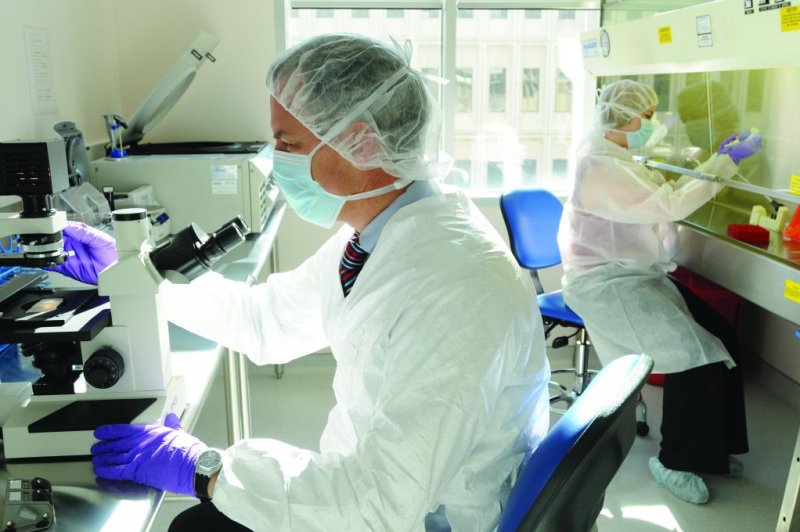The collection of medical records and information would allow researchers to develop individualized treatments based on a better, and more broad, understanding of medical conditions the cohort study would provide. Photo by National Institutes of Health.
BETHESDA, Md., Sept. 18 (UPI) -- The U.S. National Institutes of Health announced plans to create a national research participant group to expand knowledge and practice of precision, personalized medicine, with the hope of enrolling at least a million people in its first three or four years.
The purpose of the large participant group, called a cohort, is to make more information about all diseases and conditions available for research as medicine moves toward more individualized care. By combining the power of numbers with the high volume of data available from electronic health records and mobile health technologies, NIH hopes to provide scientific opportunities for new leaps in treatment and healthcare technology.
"Many factors have converged to make now the right time to begin this ambitious project," said Dr. Francis Collins, director of NIH, in a press release.
The cohort was developed as part of President Barack Obama's Precision Medicine Initiative, which has allotted $215 million in the 2016 federal budget to fund efforts to develop collections of data and research opportunities.
Precision medicine utilizes large datasets on drugs, diseases, conditions, lifestyles and other information to determine individualized treatment for patients, rather than the one-size-fits-all approach that has been the traditional approach to care.
"Americans are engaging in improving their health and participating in health research more than ever before, electronic health records have been widely adopted, genomic analysis costs have dropped significantly, data science has become increasingly sophisticated and health technologies have become mobile," Collins said.
The cohort, for which $130 million dollars has been slotted, set a series of goals for itself: develop estimates of risk for disease by integrating information on environment, genetics, and interaction of the two; identify the causes of for variation in response to medical therapies; discover biological markers that signal more or less risk of common diseases; use mobile health technology to better help patients monitor their health and crowdsource how people's actions relate to health outcomes; and to further enable more trials of medical therapy.
"We have an incredible opportunity to advance research and make new medical breakthroughs through precision medicine, which tailors disease prevention and treatment to individuals based on genetics, environment and lifestyle," said Sylvia Burwell, secretary of the U.S. Department of Health and Human Services.
Hoping to enroll at least a million people in the next couple of years -- the goal is for the cohort to begin doing so in 2016 -- members of the NIH committee that created guidelines for the cohort said they want it to be easy for citizens to join it themselves, either directly or through a healthcare provider.
In addition to the benefit this will offer researchers, individuals enrolled in the cohort will have access to all of their aggregated medical records, as well as analysis of the records and tests conducted when they enroll in the study.















